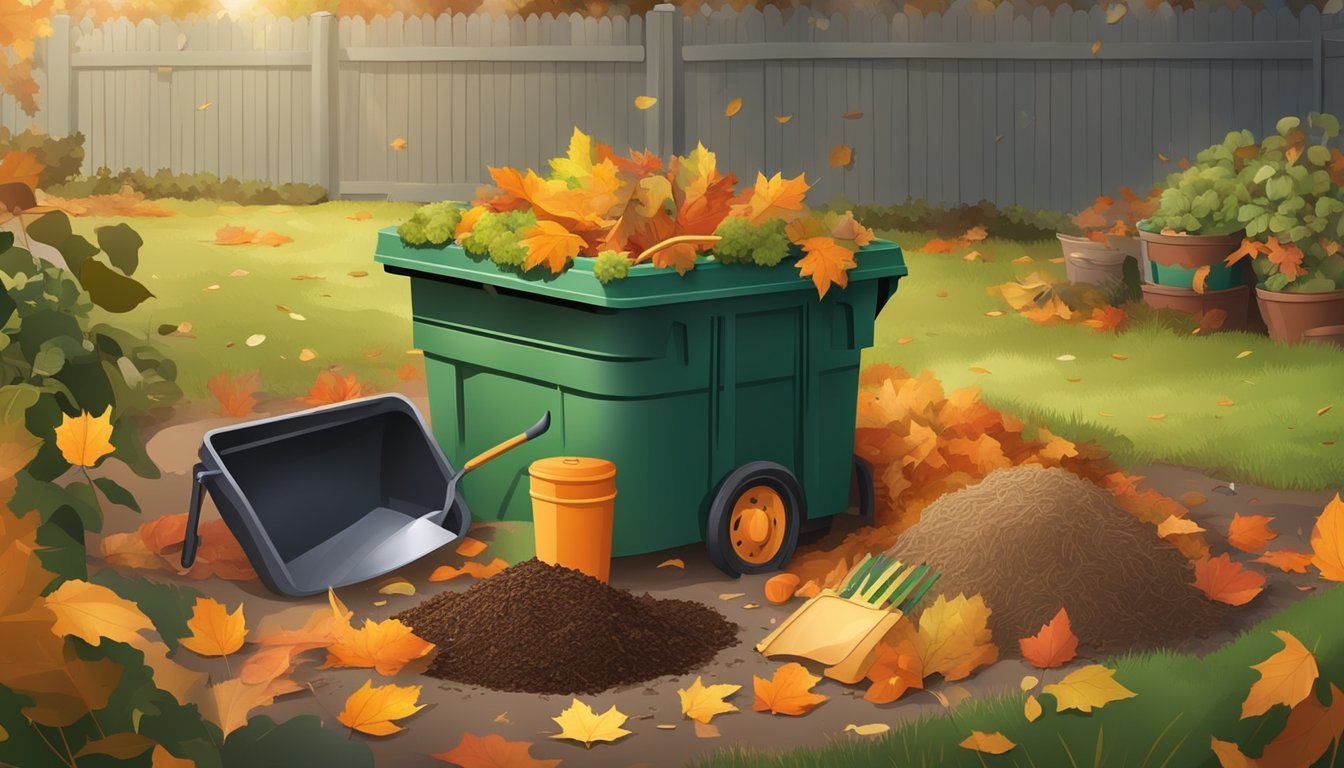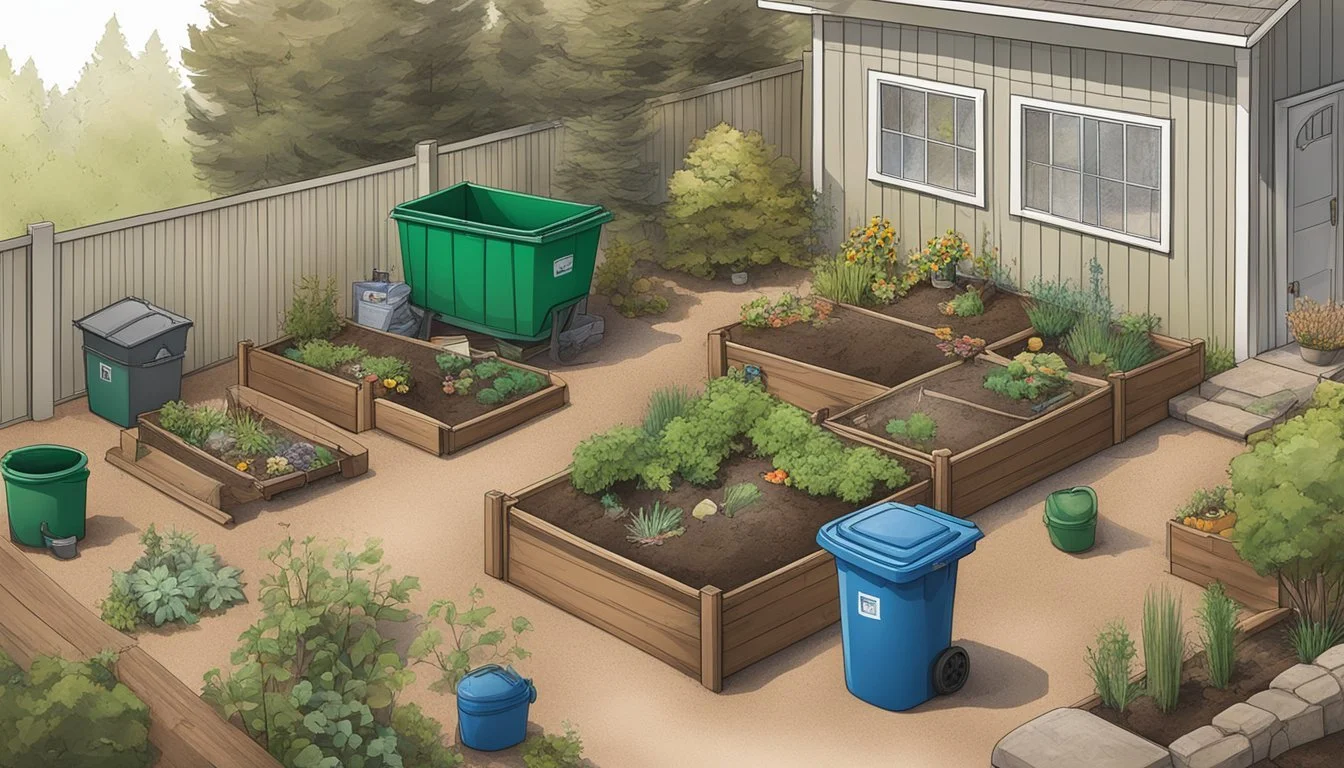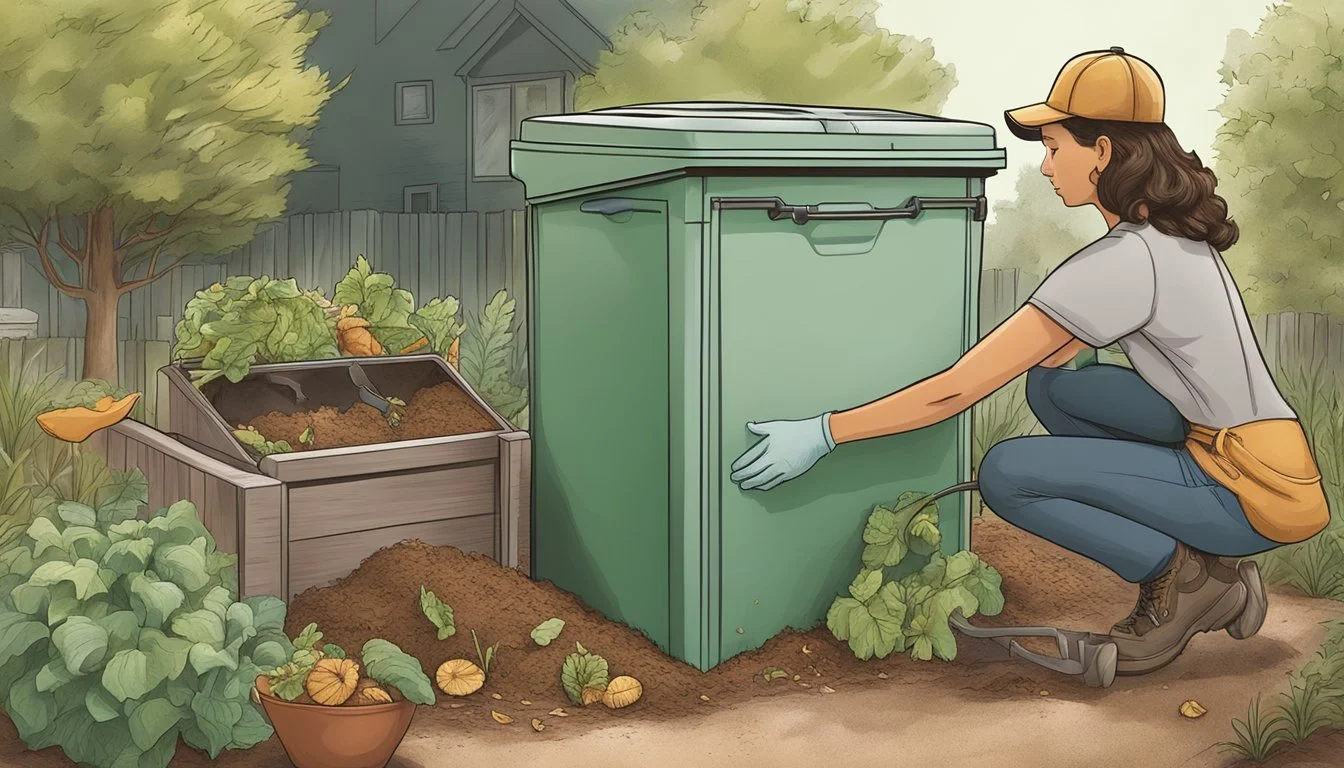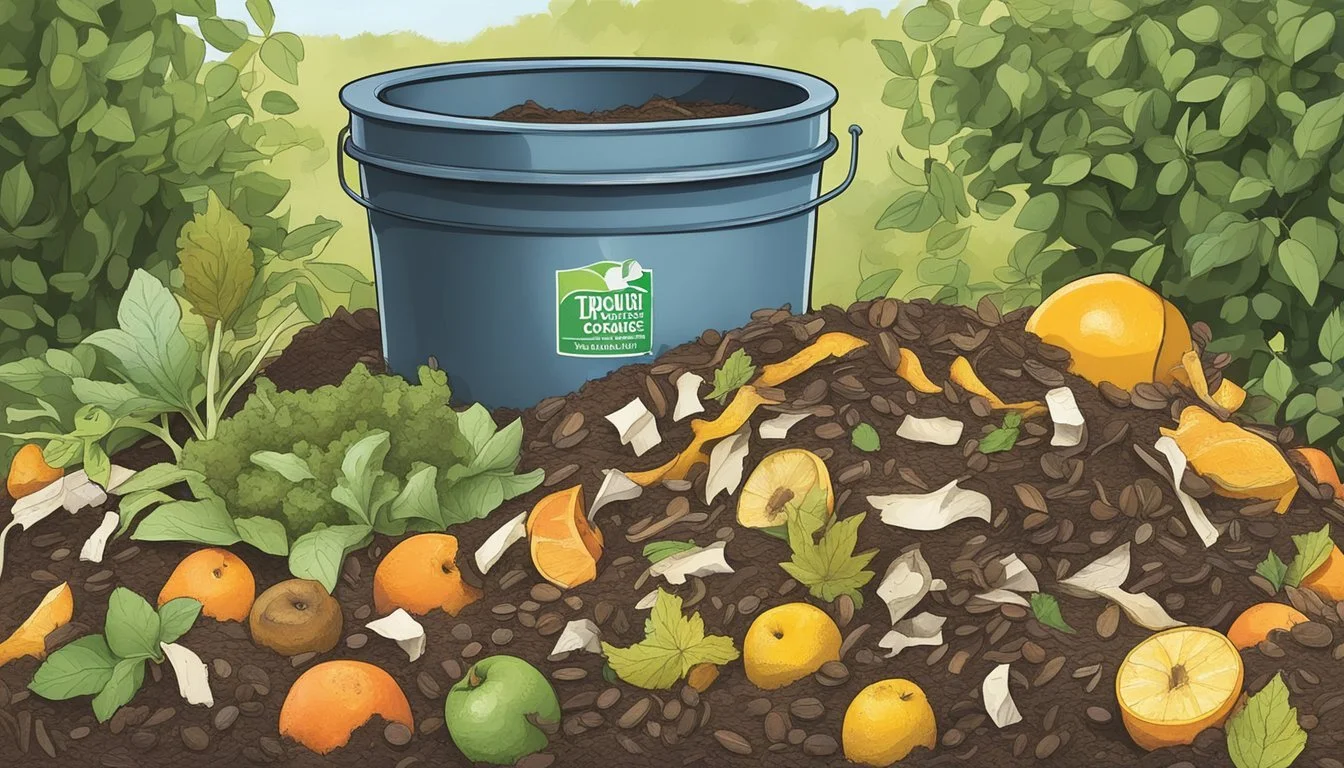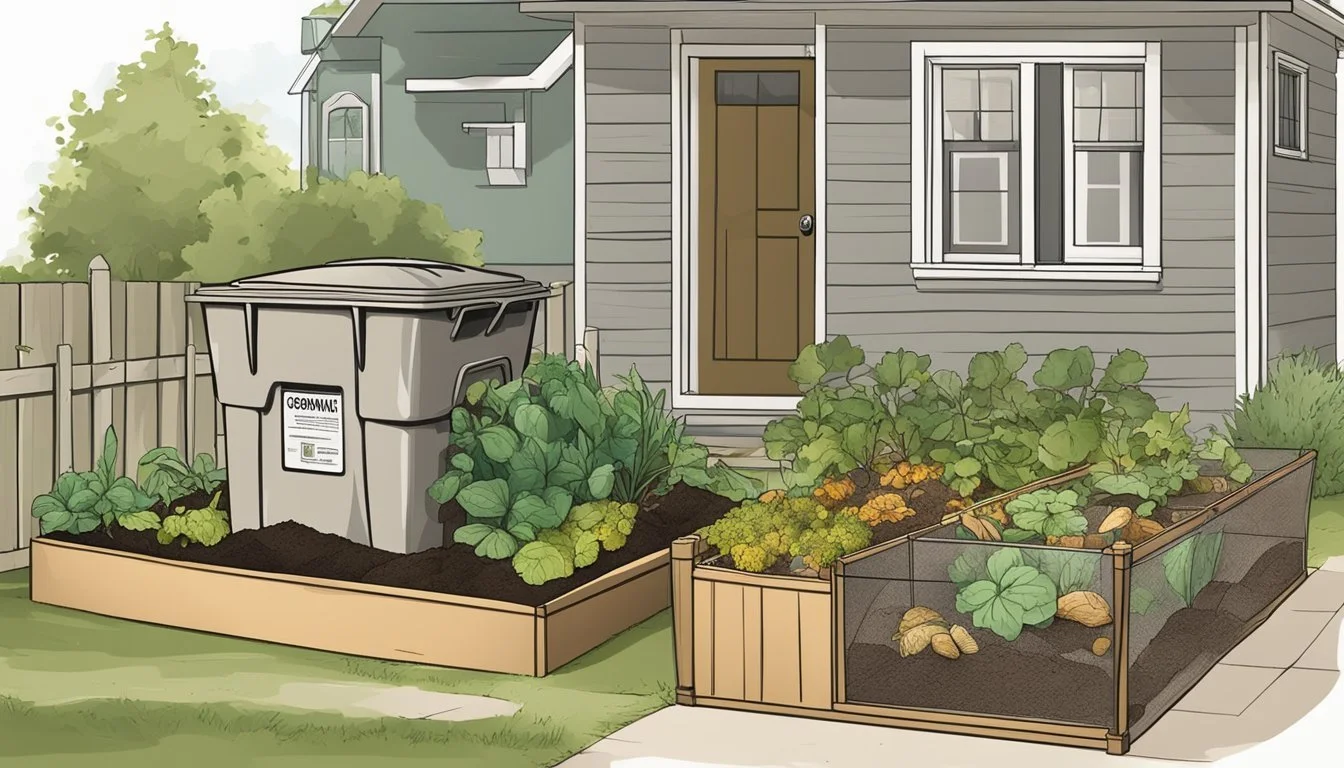Guide to Composting in Bend, OR
Simple Steps for Sustainable Waste Management
Composting in Bend, Oregon, reflects the community's dedication to sustainability and environmental stewardship. With the city's semi-arid climate and environmentally conscious residents, composting has become an integral practice for reducing waste and enriching the soil. Residents of Bend and nearby areas like Redmond have access to services that collect yard debris and food waste bi-weekly, ensuring that organic materials are not lost to landfills but are instead transformed into nutrient-rich compost.
Local initiatives and resources make composting accessible for everyone, from beginners to seasoned gardeners. Whether living in a single-family home with ample yard space or an apartment with limited room, there are options for all to participate in composting. Bend’s facilities, like Deschutes Recycling, produce high-quality compost from yard debris and independently test their products to guarantee excellence.
In addition to curbside collection services, there's a growing community of zero-waste advocates and local businesses supporting sustainable living. From educational workshops to local producers of compost bins, Bend's residents are well-equipped to integrate composting into their daily routines, contributing to a healthier ecosystem and a greener future for Central Oregon.
Understanding Composting
Composting is a process that efficiently converts organic waste into a valuable amendment for soil, enhancing its quality and fertility.
Basics of Composting
Composting involves the decomposition of organic materials by microorganisms under controlled conditions. The basic components required for composting include carbon, nitrogen, air, and water. Materials rich in carbon, such as dried leaves or paper, serve as the energy source for microbes. Those high in nitrogen, like food scraps and lawn clippings, provide the proteins necessary for microbial growth. A successful compost pile needs balanced carbon to nitrogen ratios.
The decomposition process produces heat, which, along with adequate aeration, helps to break down the materials into finer particles of compost. This is accomplished by turning the pile to introduce air, which accelerates the activity of aerobic bacteria. The layers of composting materials should remain moist, as water plays a crucial role in the microbial breakdown. The moisture level of a wrung-out sponge is ideal.
Benefits of Composting
Composting offers numerous advantages to soil and the environment. It enriches the soil with nutrients, aiding in plant growth and restoring vitality to depleted soils. Compost also increases the quality of the soil by improving its structure, aeration, and ability to retain moisture, which reduces the need for chemical fertilizers.
The use of compost can help regulate soil pH, making it more favorable for plant growth. Adding compost to soil introduces beneficial microorganisms that break down organic matter, supply nutrients to plants, and help suppress plant diseases. The enhanced soil structure also prevents soil erosion and promotes healthier root development in plants.
Moreover, composting reduces landfill waste by recycling organic resources at home, leading to a smaller carbon footprint. It captures and eliminates carbon emissions from decomposing waste, thus mitigating the impact of greenhouse gases on the climate.
Preparation for Composting
Preparing to compost is a rewarding process that can significantly reduce landfill waste and limit greenhouse gas emissions. Homeowners and community garden enthusiasts can transform both food scraps and yard debris into valuable organic matter. Here's how to begin the composting journey in Bend, Oregon.
Selecting a Compost Method
Backyard composting is an excellent choice for households with available outdoor space. It involves combining green inputs like food scraps and grass clippings with brown materials such as leaves and branches to create compost. Several methods exist, from simple open piles to more complex tumbler systems. For those living in apartments or with limited space, vermicomposting—using worms to break down food waste—can be an effective indoor option.
Choosing the Right Location
When setting up a composting system, it's critical to choose the right location. It should be a site that's:
Easily accessible year-round
Sufficiently ventilated
Close to the source of compostable materials (like a kitchen or garden)
Shielded from extreme temperatures to maintain decomposition
For backyard settings, a location with partial shade can help keep the pile from drying out in summer and from becoming too wet in winter.
Starting Your Compost Pile
Initiating a compost pile requires an appropriate mix of nitrogen-rich "green" materials and carbon-rich "brown" materials. Follow these steps:
Begin with a layer of browns at the bottom for drainage and aeration.
Add greens on top to introduce nitrogen.
Layer the materials, alternating between greens and browns.
Moisture is essential; the pile should be as damp as a wrung-out sponge.
Turn the pile regularly to provide oxygen, which is crucial for composting.
Repeat the layering process, and in time, these efforts will yield a rich and fertile compost, ideal for enhancing soil quality in gardens, reducing the need for artificial fertilizers, and minimizing food waste in the community.
Composting Materials
In Bend, OR, successful composting requires a balance of organic waste types and understanding what materials are suitable for the pile.
Greens and Browns: Understanding the Balance
A compost pile thrives on a balanced diet of "greens," which provide nitrogen, and "browns," which supply carbon. Greens are typically moist and include items like fruit and vegetable scraps, grass clippings, and coffee grounds. Browns are drier and include things like leaves, straw, and wood chips. Maintaining a balance—generally recommended at a ratio of 3:1 of browns to greens—is essential for effective composting.
Items to Compost
For a compost pile in Bend, the following items are beneficial:
Greens: vegetable scraps, fruit peels (such as banana peels), coffee grounds, tea bags, fresh plant clippings, and eggshells.
Browns: dry leaves, branches, twigs from trees, sawdust, and untreated wood chips.
It's important to chop or shred large pieces to speed up the composting process. Additionally, ensuring adequate moisture and regular turning will help create a nutrient-rich compost.
Materials to Avoid
While many organic materials are compostable, some should be avoided to prevent odors, pests, and disease:
Meats and Bones: Can attract pests and cause odors.
Dairy Products: Similar to meat, they can create odor problems and attract unwanted pests.
Diseased Plants: May spread disease into the compost and subsequently to your yard or garden.
Weeds: Some weeds can survive the composting process and sprout in your garden.
Lastly, while it's important to add a variety of materials to your compost, one should never include meat, dairy, or compostable plastics that do not break down easily in a backyard setting.
Maintaining Your Compost
Proper maintenance is crucial for creating high-quality compost. Attention to moisture levels, aeration, and the timing of turning can influence the overall effectiveness of the composting process.
Managing Moisture and Aeration
Compost requires a delicate balance of moisture and air to support the microorganisms that break down organic matter. The pile should maintain a moisture level akin to a damp sponge. If it's too wet, add more brown materials, such as dry leaves or straw, to absorb excess moisture. For proper aeration, introduce air by fluffing the pile with a garden fork, which encourages airflow and speeds up the composting process. Adequate aeration can prevent unpleasant odors and facilitates quicker decomposition.
Ideal Moisture: 40-60%
Tools for Aeration: Garden fork, compost aerator tool
The Art of Turning Compost
Turning the compost helps redistribute moisture, mixes the materials to maintain an even ratio, and introduces oxygen that's necessary for composting. Turn the compost every few weeks to encourage uniform breakdown and to inspect the pile for any necessary adjustments. Your backyard compost will benefit greatly from this simple yet effective step.
Frequency of Turning: Every 2-4 weeks
Purpose: Even decomposition, moisture balance, oxygen distribution
When Is Compost Ready?
Determining when compost is ready involves assessing its appearance and texture. Finished compost will be dark, crumbly, and have an earthy smell. It should also be cool to the touch, indicating that the microbial activity has slowed down. This high-quality compost can significantly improve soil structure and provide nutrients for plants in gardens and community spaces.
Appearance: Dark, crumbly
Odor: Earthy
Temperature: Cool
Incorporating this nutrient-rich amendment into your garden enhances the quality of your soil and, as a result, the health of your plants. Regular maintenance of your compost pile ensures a continuous supply of this beneficial material for your backyard or community garden.
Utilizing Compost
Compost enriches the soil, thereby supporting the health and growth of plants in gardens and landscaping while also serving as an effective means to reduce household waste.
In Gardens and Landscaping
Adding compost to gardens improves soil structure, which benefits garden plants and landscaping trees by encouraging stronger root systems. For optimal soil quality, it is recommended to mix compost into the top 10-12 inches of the garden soil. The impact on different types of soil is significant; for instance, clay soils become more friable and sandy soils retain water better with the incorporation of compost.
Clay Soils: Add roughly 16 cubic feet of compost per 100 square feet to enhance soil structure.
Sandy Soils: Use 24 cubic feet of compost per 100 square feet to improve moisture retention.
In terms of application, compost acts as a valuable mulch for flower beds and tree bases, helping to retain moisture and suppress weeds. Additionally, incorporating compost when planting new trees or flower gardens entrenches nutrients directly into the root zone, essential for vibrant growth.
Compost as Household Waste Reduction
Using compost at home significantly diminishes the amount of yard waste, such as grass clippings and fallen leaves. Instead of sending these materials to the landfill, households can repurpose them to create nutrient-rich compost. This natural recycling process turns kitchen scraps and yard waste into valuable compost, reducing the need for chemical fertilizers and promoting a more sustainable approach to waste management.
Households can start simple compost bins to transform daily organic waste like vegetable peelings into a resource for their gardens.
In conclusion, the use of compost brings dual benefits: it enhances the quality of soil for healthier plants and contributes to household waste reduction, emphasizing the value of sustainable practices in Bend's residential areas.
Composting in Bend
In Bend, Oregon, composting has become an integral part of waste management, with services like Cascade Disposal and initiatives at Knott Landfill transforming organic waste into a beneficial resource for the community.
Local Composting Services
Residents and businesses in Bend have access to curbside composting services. Companies like Cascade Disposal offer food waste pickup for households within Bend, Sisters, and Redmond city limits, making it convenient to participate in composting without managing a pile at home. Additionally, Republic Services operates at Knott Landfill, where they not only accept yard debris but also churn it into compost for local landscaping and gardening use. Deschutes Recycling further supports the community by providing a location where residents can bring organic waste and purchase finished compost for their own use.
Curbside Pickup: Available for residents in specific zip codes within Deschutes County.
Commercial Services: Restaurants and businesses have the option for compost pickup, fostering a wider adoption throughout the commercial sector.
Community Initiatives and Education
Composting in Bend is also supported by a strong network of community initiatives that emphasize education and participation. The Environmental Center in Bend actively works to increase awareness about composting, offering detailed explanations on how to nurture a thriving compost pile and providing workshops for residents. These efforts are complemented by programs like the Residential Composting Pilot, which aims to test and enhance food waste collection in the city. Community gardens often serve as hubs for composting education, showcasing practical applications of compost and encouraging local involvement.
Community Outreach: Local centers and pilot programs engage residents through education and encourage composting practices.
Support Resources: Information and assistance are readily available for those interested in contributing to Bend's composting goals.
Advanced Topics in Composting
For the seasoned composting enthusiast in Bend, Oregon, exploring advanced composting techniques can yield richer soil and more efficient waste decomposition. These methods employ specific processes and materials to enhance and accelerate the composting process.
Vermicomposting: Worms at Work
Vermicomposting uses worms, specifically red wigglers, to transform organic waste into nutrient-rich compost. It's a highly efficient process that requires a balanced environment with adequate moisture and aeration to thrive. The worms consume food scraps and other organic materials, and their castings create a high-quality compost perfect for enriching garden soil.
Key Steps for Vermicomposting:
Set up your container: Choose a shallow, wide container with a lid to protect from pests and to maintain humidity.
Prepare bedding: Shredded newspaper or cardboard provides carbon-rich material for worms.
Maintain proper conditions: The compost should be moist but not soggy and should stay between 55-77°F (13-25°C).
Food waste management: Feed worms fruit and vegetable scraps avoiding meat, dairy, and oily foods.
Bokashi: Fermentation Composting
Bokashi composting is a method that ferments organic waste, including food waste like meats and dairy that are typically not recommended for traditional composting. This method requires a sealable container and a specific inoculant to promote the fermentation process, which can typically reduce waste to compost in about two weeks.
Benefits of Bokashi:
Speed: Rapid decomposition of waste compared to traditional composting methods.
Odor control: The sealed container and fermentation process control smells and discourage pests.
Versatility: Accepts a variety of kitchen scraps, including items not suitable for traditional compost piles.
Incorporating these advanced composting techniques can significantly enhance the effectiveness of one's composting efforts, turning a wider variety of waste into valuable compost for the garden while maintaining the ecological balance of one's personal ecosystem.
Troubleshooting Common Issues
In composting, effectively managing odor, preventing pests, and controlling temperature are pivotal to maintaining a healthy decomposition process. The following subsections provide targeted advice for Bend, Oregon residents to ensure their compost systems operate optimally.
Odor Management
An imbalance in nitrogen and carbon or a lack of airflow can lead to unpleasant odors from a compost pile. To maintain a harmonious balance, it is advised to aim for a carbon-to-nitrogen (C/N) ratio of 25-30:1, which curbs excessive smells and promotes efficient decomposition. Food waste should be buried deep within the compost to minimize odors and avoid attracting pests. Ensure your compost is regularly turned to introduce air and distribute moisture evenly.
Pest Prevention
Pests such as rodents and insects are attracted to certain materials in compost piles, specifically meat and dairy products. To prevent pests, it is vital to exclude these materials from your compost. Additionally, incorporating yard debris like leaves or straw can create a physical barrier deterring pests. Securing your compost with a sturdy lid or wire mesh can also provide a robust line of defense.
Compost Temperature Control
Controlling the temperature within a compost pile is necessary for effective decomposition. The pile should reach between 130 to 150 degrees Fahrenheit to break down organic materials and to kill weed seeds and pathogens. If the pile is too cool, turning it to introduce air and adding green waste or water to adjust the moisture content can help increase the temperature. During colder months, insulation with extra soil or yard debris can help retain heat within the compost pile.
Composting Regulations and Best Practices
In Bend, Oregon, residents and businesses alike must navigate local regulations and adopt best practices in composting to contribute positively to waste management and environmental sustainability.
Understanding Local Regulations
Bend, Oregon, applies specific laws governing composting to support state-mandated recycling efforts and reduce the impact on landfills. It is crucial for residents to recognize that both Bend and Redmond offer yard debris and food waste collection services bi-weekly through Cascade Disposal and Republic Services. The Oregon Department of Environmental Quality provides guidelines that cover the proper methods of composting which ensure minimal greenhouse gas emissions and encourage efficient decomposition.
Eco-Friendly Composting Practices
To maximize the environmental benefits of composting, it is recommended to embrace eco-friendly composting practices. These involve:
Aeration: Regularly turning your compost to infuse it with oxygen, essential for accelerating the decomposition process.
Balance: Maintain a good balance of green (nitrogen-rich) and brown (carbon-rich) materials.
As per state recommendations, plastic should not be included in compost as it does not break down and contaminates the soil. Instead, focus on organic wastes.
Size: Breaking down larger items into smaller pieces to quicken decomposition.
Applying finished compost to the soil can improve soil structure and fertility, limiting the need for chemical fertilizers and reducing our carbon footprint by avoiding plastic packaging.
By adhering to local laws and engaging in eco-friendly composting practices, the community of Bend significantly contributes to reducing garbage sent to landfills and mitigating greenhouse gas emissions.

